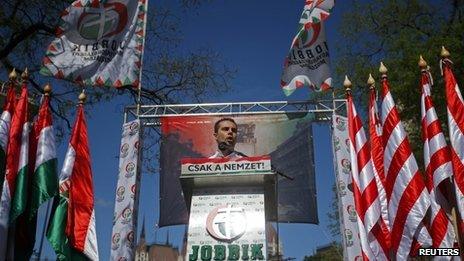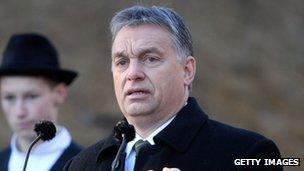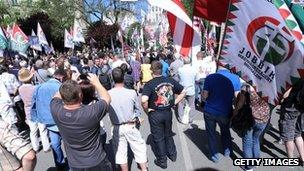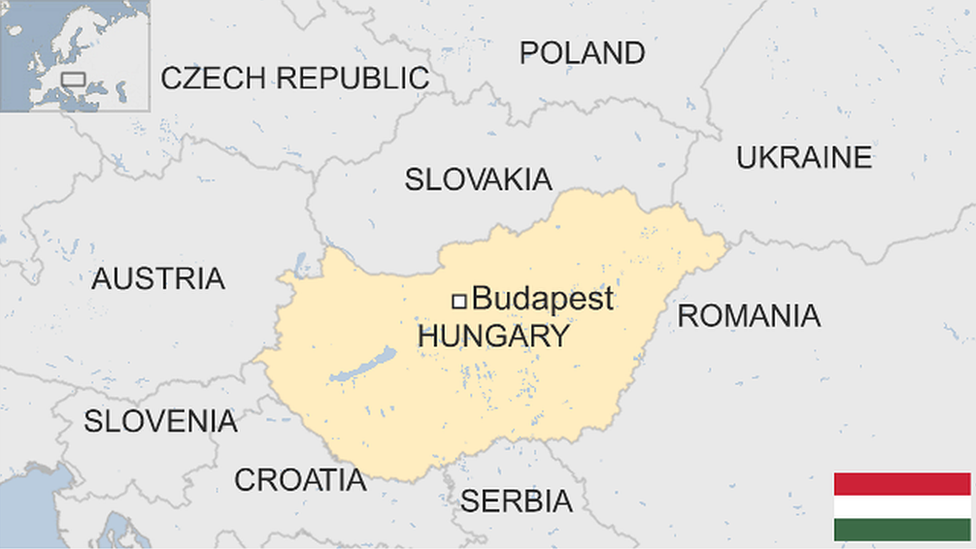Row over Nazi history consumes Hungary
- Published

Jobbik party leader Gabor Vona at a party rally
Hungary has been gripped by an intense public debate on the role of the country during World War Two.
A government proposal for a monument commemorating the German occupation of March 1944, has prompted critics to accuse it of trying to rewrite history, and deflect attention from Hungary's role as an ally of Germany up until that point, and its role in the Holocaust.
The proposal was announced just a day after an election was called for 6 April - leading some to accuse the governing conservative Fidesz party, external of stoking nationalism in order to see off the challenge from the far-right Jobbik party.
Complicity
After the proposed design for the monument - which shows an angel representing Hungary being attacked by an eagle representing the Third Reich - was unveiled last weekend, opposition figures and Jewish community leaders objected that it completely failed to acknowledge official Hungarian complicity in the wholesale slaughter of a large part of the country's Jewish population.
Rabbi Slomo Koves, the leader of Hungary's Orthodox Jewish community, said in an interview with Info Radio, external that such a monument risked implying that the Hungarian state bore no responsibility for the fate of the Jews.
Hungary under Miklos Horthy - who ruled the country from 1920 until 1944 - enacted a whole series of anti-Semitic laws from 1920 onwards, and the authorities willingly organised deportations of Jews well before 1944.
Mazsihisz, external, the organisation that represents Hungary's non-Orthodox religious communities, warned that it was considering withdrawing its cooperation in events marking the 70th anniversary of the Hungarian Holocaust because of the lack of consultation over the statue and profound reservations over various other matters relating to the interpretation of Hungarian history.

Viktor Orban said the victims of Nazism should not be forgotten
"The leadership of Mazsihisz calls on all politicians to refrain from using the 70th anniversary of the Hungarian Holocaust as an element in the electoral campaign and asks all concerned to refrain from rewriting our past," a statement said.
On Wednesday, Prime Minister Viktor Orban replied to the message from the Mazsihisz leadership with a letter - which was quoted extensively in the Hungarian media - in which he said that the fate of all victims of Nazism should not go unacknowledged, and that this was "a question of humanity and not political views or party affiliation".
At a special meeting on Wednesday, the Fidesz-led council of the Budapest district in which the memorial will be erected voted in favour of the plan. The council leader, Antal Rogan, said that it had his approval because it was not just about the occupation, but because "we are erecting a monument to all the victims, including hundreds of thousands of Holocaust victims - those who were deported, abused and murdered".
Objections
But a leading member of the Socialist Party, Csaba Horvath, said that the government's plans risked "dividing society and creating a fresh scandal by falsifying history".

A Jobbik party rally in Budapest
Szabolcs Kerek-Barczy, a member of the leadership of the left-wing Democratic Coalition, said that by erecting the monument, Fidesz would be sending "a symbolic gesture to the current Hungarian far-right and to neo-Nazis".
Critics say the government is focusing on the last year or so of the war, when Hungary was occupied by German troops after its leadership attempted to make peace with the Allies, and so airbrushing the previous years of collaboration with the Nazis.
In an interview with the independent Hungarian TV channel ATV, external, Mr Kerek-Barczy also said that the plan was a deliberate attempt on the part of the government "to gain far-right votes - the votes of neo-Nazis are valuable to them too".
Jobbik is currently the third largest party in the Hungarian parliament, and many analysts see Fidesz's efforts to woo nationalist voters as part of a campaign to prevent a large part of its natural support base from ebbing away to Jobbik in the next election.
Historians' protest
A group of 26 leading Hungarian historians has issued an open letter - published on the Galamus, external news and opinion website - in which they protested against the plan, saying that: "The memorial falsifies an important period of our history, and relativises the Holocaust in Hungary."
One of the signatories to the petition is the historian Krisztian Ungvary, an expert on World War Two who earlier in the week published an article on the news website hvg.hu, external in which he lambasted those who he said were "wasting public funds" in an effort to "whitewash" Hungary's war-time history.
Jobbik, on the other hand, has welcomed the memorial plan, but insists that it does not go far enough and that it is now time to remove a monument to the 1945 Soviet liberation of Hungary from the square on which the new monument will be erected.
BBC Monitoring, external reports and analyses news from TV, radio, web and print media around the world. For more reports from BBC Monitoring, click here. You can follow BBC Monitoring on Twitter , externaland Facebook, external.
- Published4 June 2024
